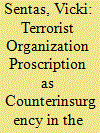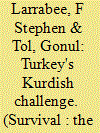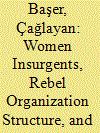| Srl | Item |
| 1 |
ID:
163215


|
|
|
| 2 |
ID:
159894


|
|
|
|
|
| Summary/Abstract |
Proscription—the designation of non-state actors as terrorist organizations—operates as one technique of counterterrorism listing, whereby individuals and populations associated with armed non-state actors are targeted for disruption, stigmatisation, and prosecution. This article examines the effects of the globalised proscription of the Kurdistan Workers’ Party (PKK) on the Kurdish conflict as a mode of counterinsurgency warfare. It argues that calling proscription a counterinsurgency strategy better connects its preemptive functions and objects with its deleterious effects on targeted populations. Moreover, this article argues that the transnational organization of the ban of the PKK casts light on how proscription extends and deepens colonial practices of counterinsurgency.
|
|
|
|
|
|
|
|
|
|
|
|
|
|
|
|
| 3 |
ID:
107155


|
|
|
|
|
| Publication |
2011.
|
| Summary/Abstract |
Turkey has been wrestling with its Kurdish issue since the foundation of the republic in 1923. The early 'Turkification' policy of the Kemalist elite met strong resistance among the Kurdish minority and sparked several outbreaks of unrest, violently suppressed, in the Kurdish areas in the east and southeast. In 1984 the issue took on a new dimension when the newly founded Kurdistan Workers' Party (PKK) began conducting terrorist attacks against Turkish territory from safe havens in the Qandil Mountains of northern Iraq. The struggle against the PKK has so far cost 40,000 lives and has hurt both Turkey's internal development and its relations with its Western allies, especially the United States.
|
|
|
|
|
|
|
|
|
|
|
|
|
|
|
|
| 4 |
ID:
132176


|
|
|
|
|
| Publication |
2014.
|
| Summary/Abstract |
Terrorist organizations use a proactive strategy in identifying potential candidates for recruitment. In such a strategy, miscellaneous vulnerabilities, grievances, and feeling destitute, inter alia, render certain individuals perfect candidates for terrorist organizations. It is therefore crucial to have an integrative approach to understand the interplay between the profiles of terrorists and their reasons to join terrorist groups on the one hand and processes of recruitment on the other. Proceeding from such a fulcrum, this article provides a general profile of the Kurdistan Workers' Party [PKK]/Kurdistan Communities Union [KCK] members and various recruitment techniques used by this group. To this end, records of 2,270 group members were content analyzed, in addition to face-to-face interviews with 42 group members and a range of individuals from public and private institutions. Our findings suggest that a variety of individual and organizational factors influence individual paths toward terrorism.
|
|
|
|
|
|
|
|
|
|
|
|
|
|
|
|
| 5 |
ID:
188192


|
|
|
|
|
| Summary/Abstract |
How do women insurgents affect rebel organizations’ structure and survivability? Scholars acknowledge the importance of organization-level dynamics and unit composition for conflict outcomes. However, our understanding of how gender-diverse cadres influence rebel survivability remains limited. I examine the mechanisms through which women sustain armed conflict. I analyze micro-organizational dynamics of rebellion through a qualitative case study of the Kurdish armed movement in Turkey between 1982 and 2015 based on the official archives of the Kurdistan Workers’ Party. I show that women insurgents enable tactical diversity, aid the organization’s coup-proofing strategy against factions, and mobilize domestic and international audiences. Women contribute most to their organization during crises and due to exploitation of gender inequalities. Analyzing the relationship between gender dynamics, group structure, and evolving rebel strategies, this study shows that the gender composition of the membership is an important factor influencing rebel survivability.
|
|
|
|
|
|
|
|
|
|
|
|
|
|
|
|